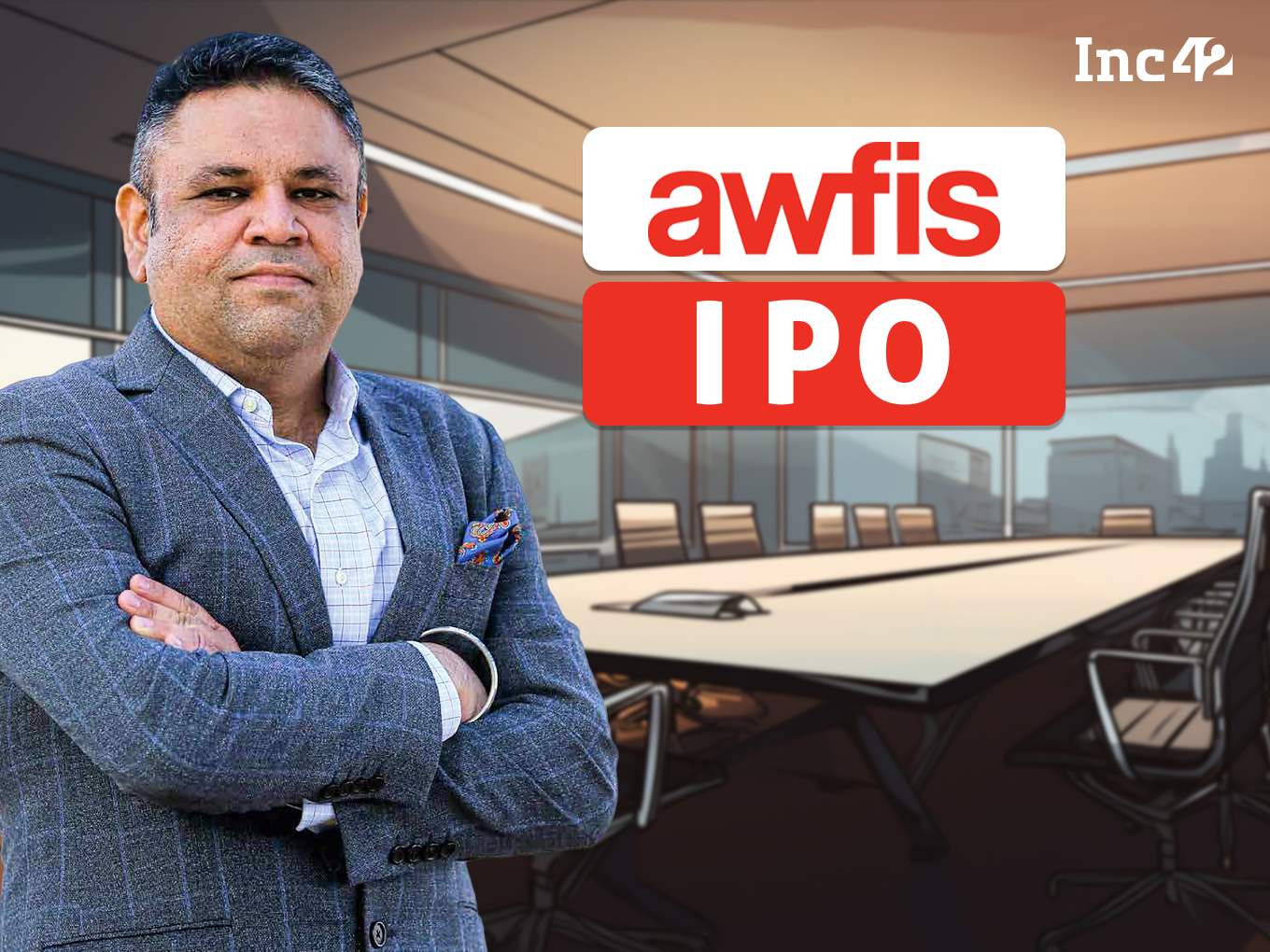Coworking space provider Awfis filed its draft red herring prospectus (DRHP) with the market regulator, the Securities and Exchange Board of India (SEBI) last week, joining the list of Indian startups aiming to go public next year.
Awfis’ public issue will comprise a fresh issue of shares worth INR 160 Cr and an offer-for-sale (OFS) component of up to 1 Cr shares.
The OFS component includes the sale of up to 50.11 Lakh equity shares by Peak XV Partners, up to 49.36 Lakh equity shares by Bisque Limited, and up to 75,174 equity shares by Link Investment Trust.
The startup plans to invest INR 52.5 Cr from the net proceeds to set up 15 new coworking spaces in FY25 across Mumbai, Bengaluru, Delhi NCR, Hyderabad, Pune, Chennai, Kolkata, Ahmedabad, Lucknow, Bhubaneswar, and Jaipur.
It plans to use INR 68 Cr for its working capital requirements and the remaining proceeds for general corporate purposes.
Now, let’s take a look at the shareholding pattern of the startup.
Zooming Into Awfis’ Shareholding Pattern
According to the draft IPO documents, Awfis has 11 shareholders holding 1% or more of the total equity capital on a fully diluted basis.
Mauritius-based investment firm Bisque Limited is the largest shareholder in the startup, owning 1.57 Cr fully-diluted equity shares, which amount to around a quarter of the total equity capital.
Peak XV Partners, one of Awfis’ early backers, is the second largest stakeholder. The investment major owns 1.53 Cr shares or nearly 23% of the fully diluted equity capital.
The founder, Amit Ramani, holds around 1.22 Cr fully diluted equity shares of the startup he set up, accounting for an 18.19% stake. Hungama Digital cofounder and ace investor Ashish Kacholia (5.01%) and Jubilant Bhartia Group promoter and Emerge Capital cofounder Arjun Bhartia (1.57%) are the other major individual shareholders in the group. Bhartia also holds a 1.31% stake in Awfis via Emerge Capital.
Early backer QRG Investments is the third largest stakeholder in the company still, as it holds more than 64 Lakh shares worth 9.58% stake on a fully diluted basis. VBAP Holdings is the fourth largest stakeholder in the coworking space provider, owning a 9.35% stake.
Interestingly, Yadu Hari Dalmia, son of Dalmia Bharat Group’s founder Jaidayal Dalmia and one of India’s most affluent businesspersons, holds a 1.89% stake in Awfis via the Shri Brahma Creation Trust.
The Coworking Space Provider’s Business Model
Founded in 2015 by Ramani, Awfis caters to freelancers, startups, SMEs, large corporates, and MNCs and offers coworking solutions. The startup, which claims to be India’s largest coworking space provider based on the total number of centres, has diversified significantly from just offering coworking centres.
“We provide a wide spectrum of flexible workspace solutions ranging from individual flexible desk needs to customised office spaces for startups, small and medium enterprises as well as for large corporates and multinational corporations,” the startup said in its draft IPO documents.
As such, the startup primarily earns revenue from coworking spaces. As of June 30, 2023, it had 121 operational centres across 16 Indian cities, with 70,242 seats. It also claims to have had 2,139 clients by the same time. These spaces are divided as follows:
Coworking: The startup has two segments within coworking – its core service, Awfis, and the premium service, Awfis Gold. The coworking spaces comprise fixed desks, flexi desks, and cabins. Flexi desks are the cheapest, starting at around INR 5,000 and going up to INR 12,000 per month, depending on the location and the city. This service allocates a different desk each time a user enters the coworking space. The fixed desk service, on the other hand, allows users to have a single desk throughout the duration. This service starts at INR 8,000 and goes up to INR 18,000 per month, based on the city and the location. Cabins are the most expensive coworking space option Awfis has on its catalogue, with prices starting from INR 9,000 per seat per month and going up to INR 62,000 per seat per month. The cabins can be anywhere between one and eight seaters.
Mobility: The mobility segment is based on a pay-per-use business model, which allows companies to pay as they use the coworking space day-to-day. The startup also offers meeting rooms, charged hourly. Awfis also offers day passes within its standard and gold service. Awfis also allows companies to have an address at a prime location via its ‘Virtual Office’ service, and with the premium version of that service, a company can also get a GST linked with the said address as well. Virtual offices start at INR 1,499 per month.
The startup also offers several other workspace-related services, such as a renovation and interior design service called Awfis Transform, and a maintenance and upkeep service, Awfis Care.
Awfis reported revenue of INR 545.28 Cr in FY23 as against INR 257.05 Cr a year ago. Its net loss declined slightly to INR 46.64 Cr in FY23. In the first three months of FY24, the coworking services provider reported an operating revenue of INR 187.7 Cr, while its loss stood at INR 8.3 Cr.
The post title=”Awfis IPO: Decoding The Coworking Space Provider’s Shareholding Pattern” href=”https://inc42.com/buzz/awfis-ipo-decoding-coworking-space-providers-shareholding-pattern/”>Awfis IPO: Decoding The Coworking Space Provider’s Shareholding Pattern appeared first on Inc42 Media.



![[CITYPNG.COM]White Google Play PlayStore Logo – 1500×1500](https://startupnews.fyi/wp-content/uploads/2025/08/CITYPNG.COMWhite-Google-Play-PlayStore-Logo-1500x1500-1-630x630.png)